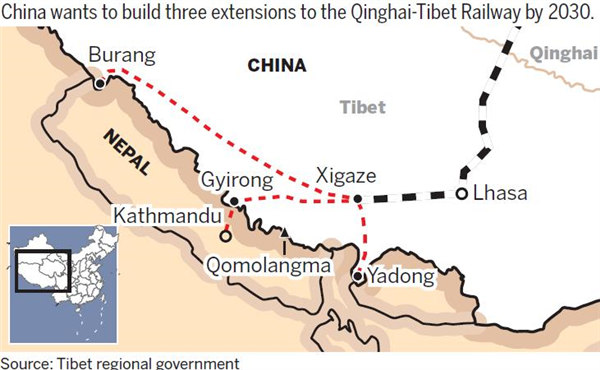 LHASA, December 11 (Xinhua) — Dozens of trucks carrying 19 million yuan (2.8 million U.S. dollars) worth of goods left the border port of Gyirong in Tibet after customs clearance on Friday, continuing the journey to their destination in Nepal.
LHASA, December 11 (Xinhua) — Dozens of trucks carrying 19 million yuan (2.8 million U.S. dollars) worth of goods left the border port of Gyirong in Tibet after customs clearance on Friday, continuing the journey to their destination in Nepal.
The new rail and road cargo service, linking Guangdong, Tibet and Nepal, aims to boost trade with the South Asian neighbor as China pushes forward its Belt and Road Initiative.
A train carrying eight carriages and 14 boxcars full of products, including shoes, clothes, hats, furniture, appliances, electronics and building materials, covered the 5,200-km distance between Guangzhou, capital of Guangdong Province, and Xigaze in Tibet.
The trucks are responsible for the remaining 870 km of the journey, carrying goods to Gyirong and then to the final stop in Kathmandu, Nepal’s capital.
“The trip between Guangzhou and Gyirong takes about five to six days, much shorter than the 20 days for sea transport,” said Yao Yanfeng, general manager of the freight carrier Tibet Tianzhi Import and Export Co. Ltd. “The time could be cut further to 3.7 days in the future.”
Yao said his company is providing relatively quick delivery service and, despite higher costs, it can meet demand for time-sensitive clients.
“In the slower winter season, the train and trucks will make a round trip every one or two weeks,” said Yao. “In the busy season next year, there will be two to three per week and, eventually, we’re aiming for four to five trips per week.”
“Nepal needs Chinese goods,” said Liu Denghui of Adam Refrigeration Equipment Co. Ltd. in Shenzhen upon hearing about the new trade route.
NEW TRADE PASSAGE
In May, China opened a rail and road cargo service between Lanzhou in northwest China and Kathmandu. The new service starting from Guangzhou serves as an important trade passage between the two neighboring countries.
Guangdong and neighboring regions, known as China’s manufacturing hubs, are a major source of imports for South Asia, including Nepal.
The trade passage, in line with market demand in the medium and long term, could help boost economic cooperation between Guangdong, Tibet and South Asia, officials said.
Luomei, assistant chairwoman of Tibet autonomous regional government, said with efficient trade transportation, the freight service could help relocate more businesses along the passage, bringing growth momentum and industrial transformation to the plateau region.
Gobinda Bahadur Karki, consul general of Nepal in Lhasa, said the freight service will help boost Nepal’s economic growth as well as bilateral trade.
MORE INFRASTRUCTURE
To further facilitate trade, China is planning to build a railway between Xigaze and Gyirong to shorten the trip.
Yang Guoliang, an official with the Tibet Autonomous Regional Department of Commerce, said Tibet will build and reopen more border ports to expand the trade passage to South Asia.
The trade passage is a national strategy linking China’s economic heartland with South Asia, said Yang.
Apart from ports and trade passages, China will build border economic zones with South Asia, said Wang Yanqing of the transport research institute under the National Development and Reform Commission, China’s top economic planning agency.

